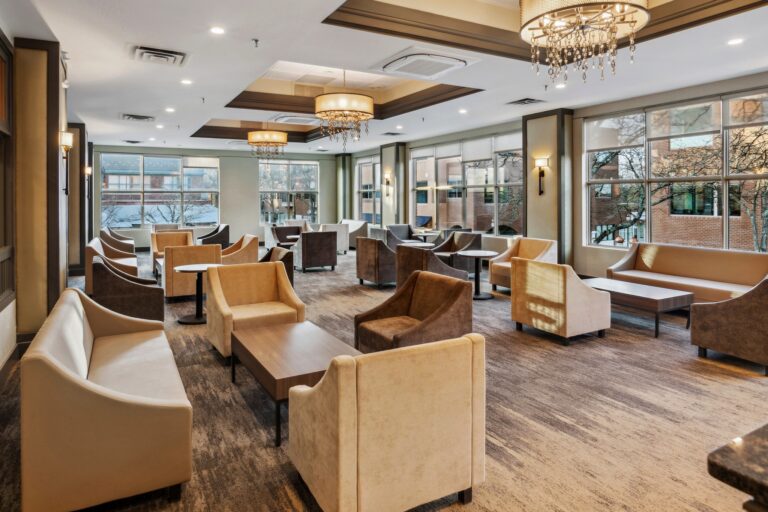The buzz of machinery and the scent of wood have long been synonymous with American commercial furniture manufacturing. Yet, a subtle but significant shift is underway, as women steadily carve their niche in this traditionally masculine industry. Within the high-end commercial furniture sector, a young immigrant woman, Yana Katliarova, is actively driving this transformation, challenging norms and reshaping the very fabric of leadership.
The statistics paint a stark picture. According to the U.S. Census Bureau, women constitute a mere 26% of the furniture manufacturing workforce. Even fewer ascend to leadership positions, a reflection of the enduring gender imbalances that persist within the industry. Katliarova, managing partner of Modern Line Furniture, a prominent New York/New Jersey metro area-based manufacturer, stands as a testament to the burgeoning influence of women, particularly young women, in this sphere.
Her journey, however, wasn’t a calculated ascent. It was a serendipitous convergence of opportunity and aptitude. A native of Belarus, Katliarova arrived in the U.S. as an exchange student 15 years ago, armed with a vision of a career in finance or international business. Joining Modern Line Furniture as an office manager in 2013 was a detour, a temporary stop on her envisioned trajectory.
“My dream was to become a chief financial officer or work in international business. I never considered managing in a huge commercial factory. But I fell in love with the company,” she recalls, her voice imbued with a sense of genuine affection.
Her trajectory took an unexpected turn when Vlad Spivak, the company’s owner, recognized her latent leadership potential. The managing partner position was offered, a proposition that was both exhilarating and daunting. “I was excited to apply my business knowledge, but it was also a very confusing time for me,” she admits, acknowledging the steep learning curve that lay ahead.
Her initial challenges were daunting. “In the beginning, I was unfamiliar with industry terminology and production processes. I had to learn about the tools, machinery and raw materials. I had to understand the differences between various furniture styles. And it was essential that I become well-versed in industry standards. And of course, one of my early challenges was learning how to manage an all-male workforce.”
The absence of female role models compounded the challenge. “There aren’t many women in U.S. manufacturing, and especially not a traditional type of business like ours. We’re not manufacturing semiconductors. We’re making and customizing high-quality wood-framed commercial furniture.”
Gaining the trust of the seasoned craftsmen required a delicate balance of assertiveness and humility. Initially, some workers would bypass her authority, seeking Spivak’s input. “We quickly figured out that they were testing us. So, we emphasized that I was on their side. I asked them to teach me what they knew,” she explains. “During the pandemic, I stayed over time to help them push orders and load trailers. Slowly, they started helping me to learn what I needed to know, and the work environment became much more fun and collaborative.”
Spivak affirms the transformation. “It took a while but now they all admire her. They approach her with questions and show her tremendous respect. The experienced employees tell new hires that she’s smart and knows what she’s doing.”
Her influence extends beyond the factory floor, resonating with Modern Line Furniture’s prestigious clientele, which includes W Hotels, Hilton, Hard Rock Cafe and Ritz Carlton. “At first, I had customers asking to speak with the manager or the owner of the company. They were surprised when I’d answer their questions and manage their projects with such strong confidence. Over time, I earned their trust and loyalty by showing them that I am fully capable of taking care of their projects.”
Customers have also come to value her unique perspective. “Most customers don’t know exactly what they want at the beginning of the process. As a woman, I can imagine which products, materials and styles will work best in their space. It’s exciting to help our customers maximize their seating capacity so they can make more money, or to help them to reduce the stress of opening a new establishment by helping them design furniture with the correct colors, styles and materials.”
Her leadership has demonstrably impacted the company’s bottom line. “Since I joined Modern Line Furniture, our average orders have tripled in dollar value. We have recently started getting a lot of government contracts, drawn by our quality and the fact that we make all of our furniture in the U.S. with only American-made materials. We just delivered a huge project for an entire floor of the World Trade Center. I have even been contacted by well-known celebrity chefs!”
For young women entering male-dominated industries, Katliarova offers sage advice: “Be flexible and be ready to adapt. And learn to read people. Listen closely to what they say, and pay attention to what may be going unsaid, so you can understand what they need. And most important: Keep learning and don’t be scared of asking for help. I am proud of where I am right now. And I’m amazed by the opportunities ahead of me.”
Katliarova’s story is more than a personal triumph; it’s a microcosm of a broader shift, a testament to the transformative power of diversity and the unwavering determination of women to leave their indelible mark on the American manufacturing landscape.




